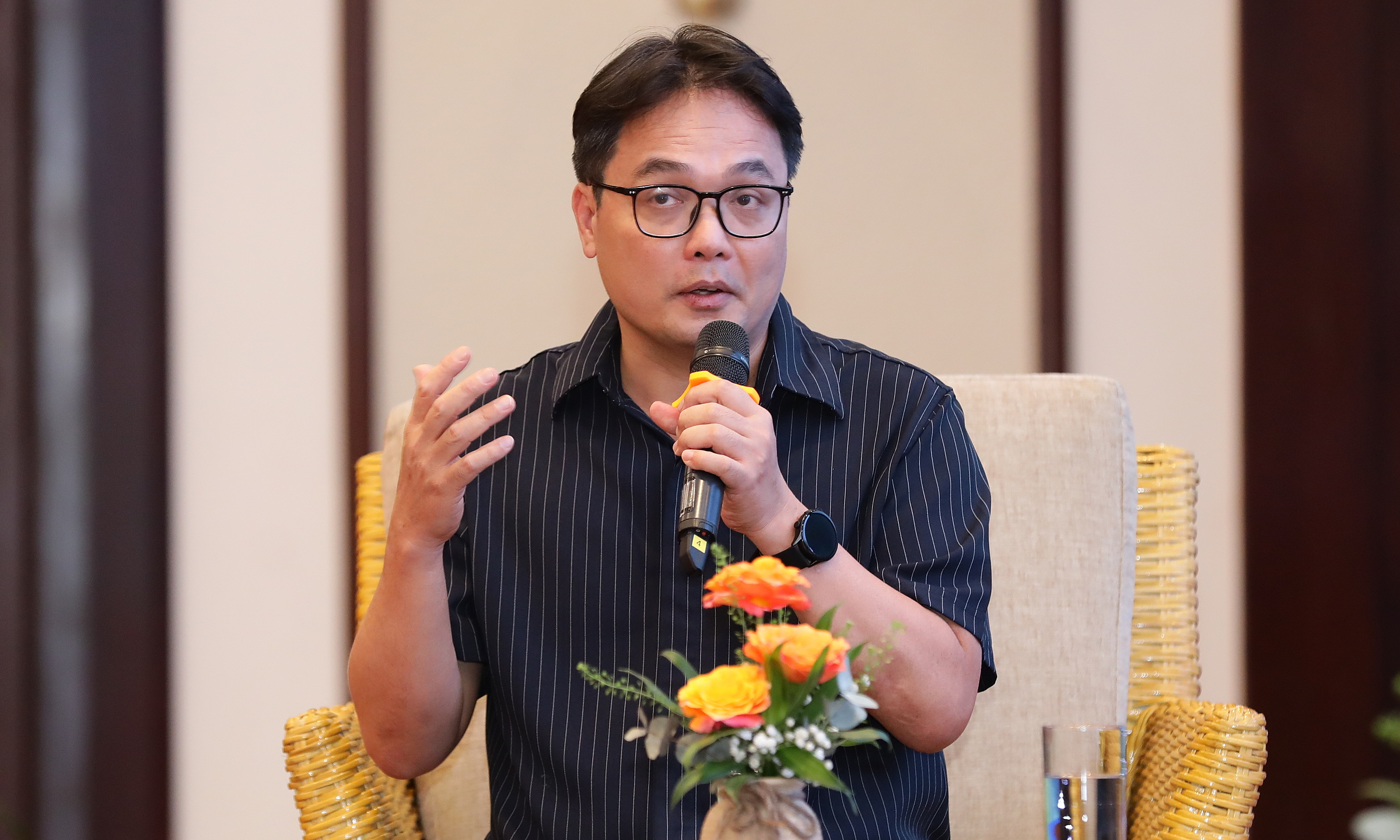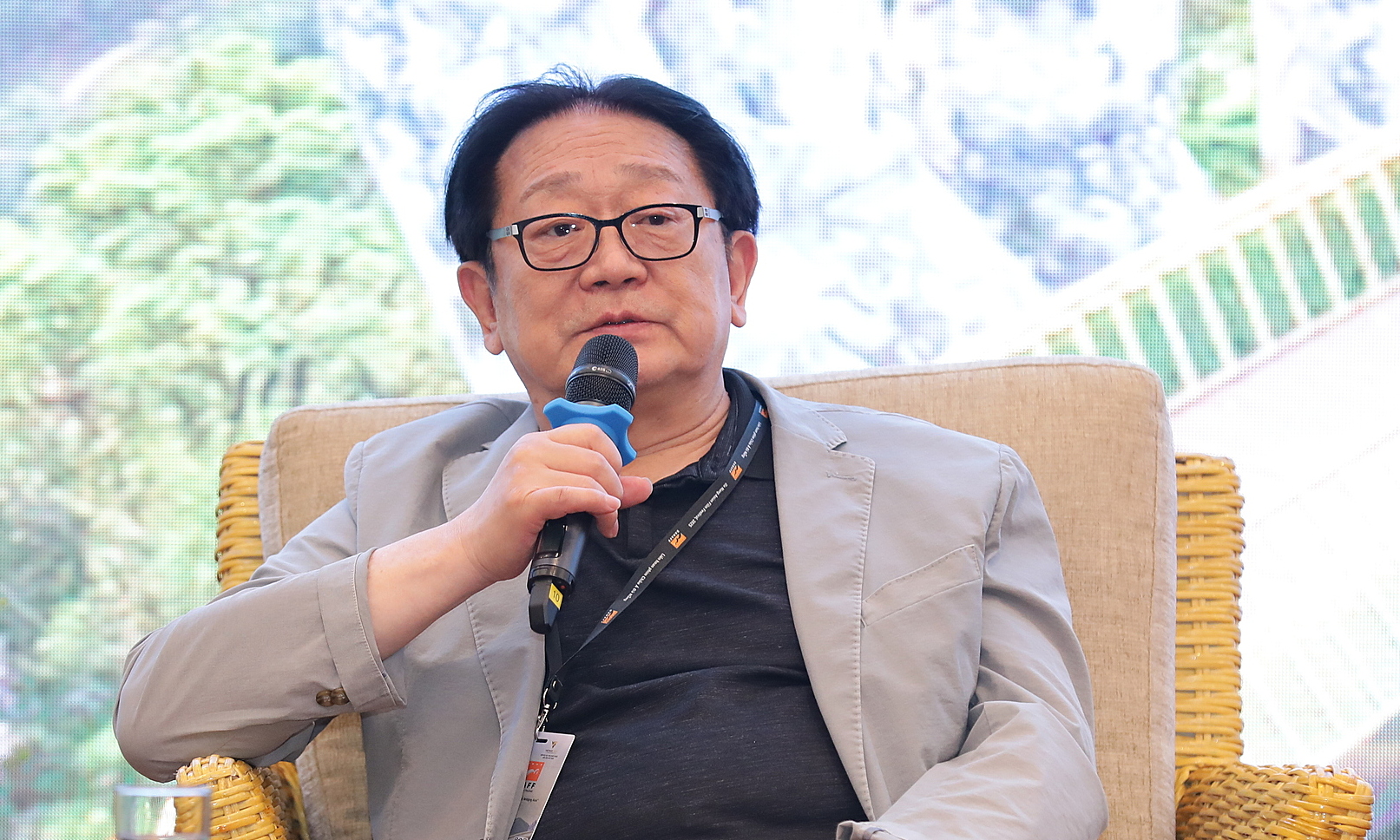Domestic and international film professionals and experts gathered at a seminar titled "Korean Cinema - International Success Lessons and Film Industry Development Experience" within the framework of the Da Nang Asian Film Festival 2025.
Discussing the conditions for sustainable film industry development and regional competitiveness, Doctor of Literature and screenwriter Dao Le Na emphasized the importance of establishing a film development support fund. This fund would provide filmmakers with stable financial resources and a foundation for long-term creativity.
Independent filmmakers often spend years completing projects, not due to a lack of ideas or scripts, but because of the arduous process of seeking funding. Director Phan Dang Di shared that he often has to secure small grants from international funds, which prolongs production beyond initial estimates.
In 2010, his debut film, "Bi, Don't Be Afraid!", premiered and won two awards at Cannes Critics' Week. 5 years later, he released "Father and Son" which competed for the Golden Bear at the 2015 Berlin International Film Festival. "That's too long for a film, while the film industry changes daily," the director said.
 |
Director Phan Dang Di speaks at the seminar on 30/6. Photo: Minh Nguyet |
Director Phan Dang Di speaks at the seminar on 30/6. Photo: Minh Nguyet
The amended Law on Cinema mentions the establishment of a support fund, not only for large studios but also for film projects with social and cultural significance, independent filmmakers, and those facing financial difficulties. However, no agency has yet been assigned to implement or provide detailed guidance on this fund.
Currently, the state only invests in commissioned films, prioritizing experienced directors. Funding for independent filmmakers comes from foreign government funds and private businesses. In Vietnam, aside from some talent support from the Hanoi International Film Festival and the Da Nang Asian Film Festival, there is no well-established national film development fund.
Vietnamese directors often seek support from international film festivals and production companies abroad. Director Bui Thac Chuyen, for example, received support from France, South Korea, and Singapore for his 2022 film "Glorious Ashes." Director Pham Thien An, whose "Inside the Yellow Cocoon" won the Camera d'Or at the 2023 Cannes Film Festival, also secured funding from various sources, including the Singapore Film Commission, Purin Pictures (Singapore), and Normandie Images (France).
The CJ Short Film Project, initiated by CJ CGV Vietnam, is one of the few systematic support programs, aimed at enabling young filmmakers to create short films for international competitions. However, this program alone is insufficient to address the lack of industry-wide support mechanisms.
Trailer for "Memories of Murder" (2003) by director Bong Joon Ho. The film received financial support from the Korean Film Council (KOFIC), which allowed Bong Joon Ho to make a large-scale film after the success of his debut work "Barking Dogs Never Bite." Video: Madman Films
In countries with developed film industries like South Korea, Thailand, and Japan, filmmakers have access to national funds, primarily from businesses or government budgets, to invest in scripts, film production, and promotion at international festivals.
At the seminar, several Korean experts proposed solutions to support Vietnam in building a film development fund and an ecosystem for the industry. Director Kim Hong Joon, head of the Korean Film Archive (KOFA), noted that the formation of such a fund isn't always straightforward. "Initially, South Korea also lacked support and struggled with how to assist independent projects. However, by acknowledging our limitations and embracing new ideas, we gradually built a professional operating system that laid the foundation for the breakthrough of our national cinema," he said.
According to Kim, money isn't the only factor; government agencies need vision and societal support. In South Korea, leaders recognized early on the role of cinema as a tool to convey national identity, thoughts, and stories to the world. Consequently, they made cinema a key part of the national soft power strategy.
Since the 1990s, South Korea has developed a film support model focused on empowering filmmakers. The government established the Korean Film Council (KOFIC) to promote and support domestic films. KOFIC's principle is to avoid interfering in the creative process but to provide backing, allowing directors and crews to maintain their artistic voices.
In addition to direct project funding, KOFIC built an ecosystem, including a film academy to train new filmmakers, box office revenue management to ensure financial transparency, and a flexible return-on-investment mechanism based on actual distribution performance.
This model not only reduces financial pressure on filmmakers but also allows them to focus on creativity. Thanks to the comprehensive support system, directors like Bong Joon Ho ("Mother," "Parasite") and Park Chan Wook ("Oldboy," "Decision to Leave") have created groundbreaking works with distinct artistic styles that are competitive in the international market.
 |
Busan International Film Festival chairman Park Kwang Soo at the seminar on 30/6. Photo: Minh Nguyet |
Busan International Film Festival chairman Park Kwang Soo at the seminar on 30/6. Photo: Minh Nguyet
Sharing this view, Park Kwang Soo, chairman of the Busan International Film Festival, stated that a film industry cannot thrive solely on box office revenue or mainstream entertainment films. The field needs space for artistic and experimental works that reflect cultural and social depth to create a balanced and sustainable ecosystem.
"For a cultural industry to reach the scale of South Korea's, in addition to the talent of filmmakers, we need the collaboration of policymakers and society. They must recognize that cinema not only creates change for the industry but also for the entire nation," he said.
Que Chi












